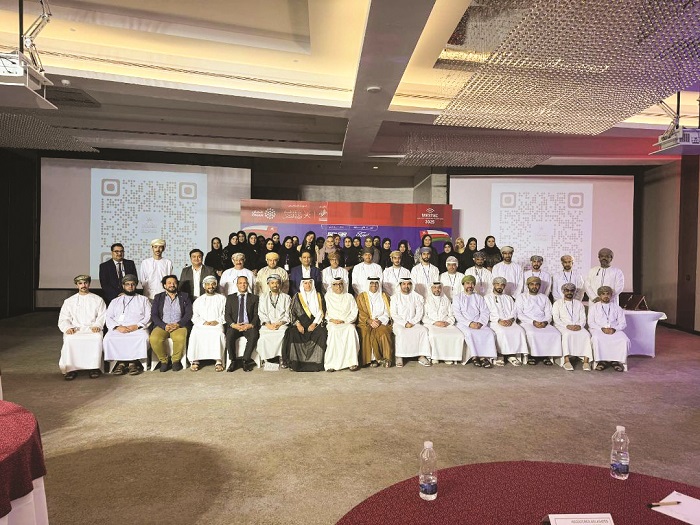Muscat: The Middle East Strategic Communications Conference (MESTEC 2025) concluded successfully on Wednesday at the Intercity Hotel Muscat.
Now in its 13th edition, the two-day event brought together leading communication experts from academia, government, and the private sector to discuss the future of strategic communications in Oman and across the Arab region.
The second day featured several sessions covering diverse topics.
Karma Al Taher, Public Relations and Media Consultant at Muriya, spoke about the role of strategic communications in crisis management and highlighted the importance of utilising artificial intelligence to enhance media presence.
Khalid Al-Kuwari, Board Member of the Qatar Chamber of Commerce and Industry, discussed the vital role of communication and media for economic institutions, noting that the chamber leverages media to promote itself locally, regionally, and globally.
Colonel (Eng.) Mohammed Al-Jassasi addressed the topic of rumours and their societal impact, explaining the different types of rumours and how not only individuals but even organisations and governments may sometimes contribute to spreading them.
Khalid Orabi, Managing Editor and Director of Business Development at Muscat Media Group, spoke about the transformations shaping Oman’s public relations industry.
He highlighted PR’s role in conveying an organisation’s message—whether a company, ministry, or government—and questioned whether PR agencies in Oman have reached an industrial level.
He also outlined the distinction between traditional media channels (such as print, online newspapers, radio, and television) and social media platforms, emphasising the growing use of AI in PR and media, along with both its benefits and risks.
Dr Hamid Al-Niyadi, President of the Emirates Association for Public Administration, discussed strategies in international relations, diplomacy, and soft power, citing the UAE’s experience as a leading example.
He noted that “the international system is witnessing rapid shifts in power dynamics and methods of influence—hard power is no longer the only determinant of impact,” adding that “soft power has become one of the most important tools for building a national image and influencing global opinion.”
Dr Moza Al-Rawahi from the Department of Media at Sultan Qaboos University explored how media outlets benefit from technological advancements, particularly algorithms and AI applications. She explained that while artificial intelligence itself is not new, its recent prominence stems from the availability of accessible applications that have made its role more visible.
Conference Chairman Dr Tariq bin Khalifa Al-Sheikhan Al-Shammari, President of the Arab International Relations Council (CARINTER) and the Gulf Strategic Communication Center (GSC), affirmed that the conference will continue to be held in Muscat in the coming years.
He underscored the importance of political and national media, saying that countries bear a major responsibility in this field.
Dr Al-Shammari also highlighted the role of non-profit organisations and shared his experience working with a group of Arab peers in Al-Kharj to establish an Arab coalition to parallel other international lobbying groups.
Mounes Al-Mardi, Editor-in-Chief of Al-Bilad newspaper (Bahrain), emphasised the need to further develop journalism and media, noting that they remain the most reliable sources of information compared to social media. He underscored the significance of soft power in promoting countries and attracting international attention, citing Bahrain’s Formula One circuit as a successful example of national branding.
He also warned against fabricated news and misinformation, explaining that some actors exploit digital media to sow doubt or destabilise societies before targeting governments. He noted that Gulf countries are aware of such threats, with many incorporating digital and civic education into school curricula to strengthen media literacy.
Following the final sessions, Dr Tariq Al-Shammari presented certificates of appreciation to speakers, participants, and sponsors.
The conference was organised by Muscat Media Group (MMG) and managed by Nexus Novel, with support from the Gulf Strategic Communication Center (GSC) and the Arab International Relations Council (CARINTER).
This year’s edition was sponsored by Ford, a globally recognised brand known for innovation, performance, and progress. Ford’s participation reflects its vision of leading transformation beyond mobility—by supporting innovation, technological advancement, and leadership in communication across industries.
Additional support came from SOHAR Port and Freezone. The event gathered around 200 participants representing government institutions, major corporations, and media organisations, including ministries and public relations firms.
Prominent speakers from Oman and the GCC presented forward-looking insights on artificial intelligence, digital media, and institutional excellence in strategic communication.
